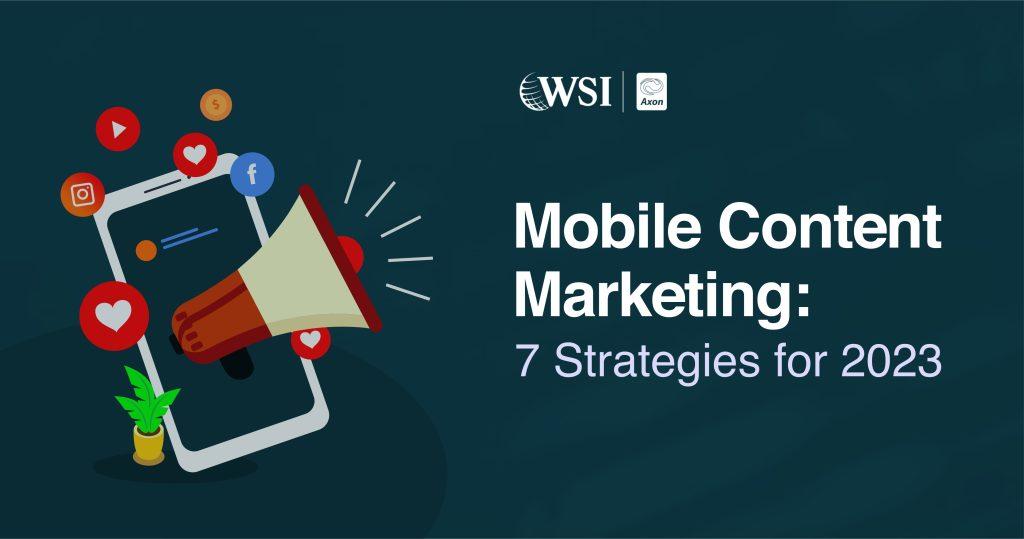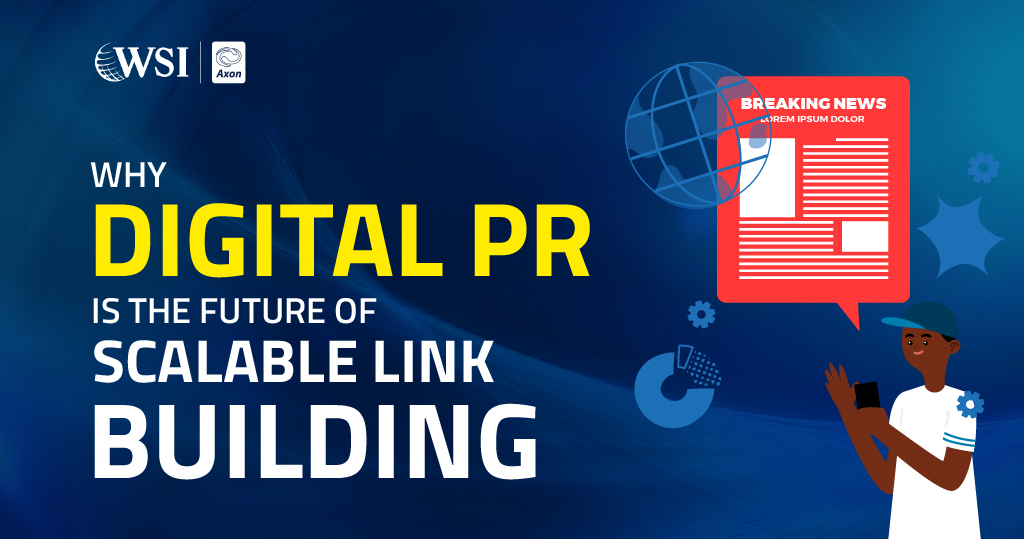In the race for audience and growth, mobile content marketing will continue to be one of the top trends in marketing. Digital adoption and activity are also increasing because of the continued growth of mobile usage. Nearly 60% of the world’s web traffic comes from mobile phones, and 92.3% of internet users go online via a mobile device at least occasionally.
Over two-thirds of the world’s population owns a mobile phone, with 5.44 billion unique mobile users in January 2023.
The conversion rate of these users is up to five times higher than desktop users, which means you can reach more potential customers in 2023 by appealing directly to their mobile devices. Digital marketers need to adapt their content strategies to suit the changing trends.
What is Mobile Content Marketing?
Mobile content marketing is a marketing strategy that involves creating and distributing content designed for mobile devices. It requires developing and sharing valuable, relevant, and engaging content tailored for mobile audiences and delivered through mobile channels, such as mobile-friendly websites, mobile apps, and social media platforms.
Mobile content marketing aims to reach and engage with target audiences on the devices they use most often, such as smartphones and tablets. Mobile content marketing can take various forms, such as text, images, videos, and audio content. And can appear through different channels, such as email, social media, and messaging apps.
Who should use Mobile Content Marketing?
Mobile content marketing is for any business (B2C and B2B brands) that wants to reach and engage with its target audience through mobile devices. It can be effective for companies with a mobile app, mobile-friendly site, or businesses that sell products or services that regularly purchase on mobile devices.
Mobile content marketing is vital for businesses that want to reach adult audiences. According to a report by Statista, the number of smartphone users in Nigeria will grow to over 140 million by 2025. Currently, estimates from sources put the number of smartphone users in Nigeria at roughly 25 and 40 million.
In addition, mobile content marketing can also be effective for demographic groups, such as millennials, Gen Z, and busy professionals who are always on the go. By providing relevant and engaging content for mobile devices, businesses can improve customer engagement, build brand loyalty, and ultimately increase sales.
Seven Mobile Content Marketing Strategies for Businesses
Here are seven (7) strategies for mobile content marketing in 2023:
- Video Marketing Content
- Voice Search
- Podcasts
- Geofencing
- Micro-Influencer Marketing
- Messaging Apps
- Developing a Mobile App
1. Video Marketing Content
Creatively use mobile video marketing by adjusting it for mobile devices. Here are some additional details on using video content for mobile marketing:
- Short-form Videos: Short-form videos, such as 30-second ads or social media videos, are effective for mobile marketing. They are easy to consume on the go, providing a quick and engaging way to showcase your message or product.
- Vertical Video: Vertical video, designed for viewing on mobile devices, has become increasingly popular. It takes up the entire screen, which can help capture the user’s attention and provide a more immersive experience.
- Mobile-Optimized Content: When developing video content for mobile devices, it is essential to consider factors such as load time, video quality, and aspect ratio. Videos that are slow to load or display incorrectly on mobile devices can turn off viewers and negatively impact engagement.
- Storytelling: Video content is an excellent medium for storytelling, as it can create an emotional connection with the viewer. Marketers can use video content to tell the brand story, showcase their values, or provide customer testimonials. Storytelling can help build brand loyalty and trust.
- Call-to-Action: Video content can drive conversions by including a call-to-action (CTA). CTAs can encourage viewers to take specific actions, such as subscribing to a newsletter, following the brand on social media, or making a purchase.
2. Voice Search
Tighten your voice search by optimizing your website and content for voice search queries initiated using voice-activated assistants like Siri, Alexa, Google Assistant, and other voice-activated devices. Here are a few strategies for optimizing your content for voice search:
- Use natural language: People use natural language when speaking, so it’s essential to use conversational language and long-tail keywords in your content that match how people talk.
- Focus on FAQ and long-tail keywords: When people use voice search, they are more likely to ask questions, so it is necessary to focus on answering frequently asked questions and using long-tail keywords that reflect the queries people are asking.
- Make your content scannable: With voice search, people want quick answers, so it is vital to make your content scannable, using headers, bullet points, and lists to help users find what they are looking for quickly.
- Optimize for local search: With the rise of smart speakers, more people are using voice search to find local businesses and services. So it is crucial to optimize your content for local search, using local keywords and ensuring your business information is up-to-date on Google My Business and other local directories.
- Improve page speed: With voice search, speed is everything. If your page takes too long to load, people will quickly move on to another site. So it is essential to optimize your website for speed and ensure your pages load quickly.
3. Podcasts
Podcasts are a growing medium for mobile content marketing. They offer a unique opportunity for mobile content marketing, allowing brands to create long-form, informative, and engaging content that is easy to consume on the go.
Here are some benefits of podcasting for mobile content marketing:
- Builds Thought Leadership: Podcasts allow brands to showcase their knowledge and expertise in their respective fields. By creating informative and educational content, brands can position themselves as thought leaders and establish credibility with their audience.
- Increases Engagement: Podcasts are an intimate and engaging medium that can hold the listener’s attention for extended periods. Brands can use storytelling, humor, or interviews to create content that resonates with their audience.
- Provides a New Channel for Marketing: Podcasts offer a new and unique way to market products or services. Brands can use podcasts to promote new products, offer exclusive discounts, or provide in-depth product reviews.
- Increases Brand Awareness: Podcasts can be a great way to introduce new audiences to a brand. Listeners can discover podcasts through recommendations, word-of-mouth, or through podcast directories. Podcasts can help to expand a brand’s reach and increase its visibility.
- Offers Long-Term Value: Podcasts are a type of evergreen content that has the potential to provide long-term value. Unlike social media or email marketing, podcasts can continue to attract new listeners over time, as they are often discoverable through search engines or directories.
4. Geofencing
Since your audience is mobile users, you cannot overlook Geofencing. It is a location-based mobile marketing tactic that uses GPS or RFID technology to define a geographic area. When a user enters or exits the perimeter, the technology triggers a specific action, such as a push notification or a targeted message.
Geo-fencing can create location-based campaigns that target specific areas, such as a mall, a park, or a city center. For example, a retailer can create a geo-fencing campaign that sends a push notification to customers who enter a mall. Offering them a discount on a specific product or inviting them to visit the store.
5. Micro-Influencer Marketing
This marketing strategy involves partnering with individuals with little but highly engaged followers on social media to promote a brand’s products or services. Micro-influencers typically have a following between 1,000 to 100,000 followers. But their audience is more targeted, niche-specific, and engaged than macro-influencers or celebrities. To use micro-influencer marketing in mobile content marketing, marketers can follow these steps:
- Define the goals: First, marketers need to define the objectives of the micro-influencer campaign. It could be to increase brand awareness, drive traffic to a website, or promote a specific product or service.
- Identify the target audience: Marketers need to identify the target audience and the micro-influencers that cater to that audience. Marketers can use tools like social media analytics or influencer marketing platforms to find the right micro-influencers.
- Establish partnerships: Marketers can establish partnerships with these influencers. It can involve offering free products or services, paying for sponsored content, or offering affiliate commissions.
- Create content: Marketers should work with the micro-influencers to create mobile-optimized content that promotes the brand’s products or services. It is possible to share this content on social media, blogs, or other mobile platforms.
- Track and measure the results: Finally, marketers should track and measure the results of the micro-influencer campaign. It can involve tracking engagement, click-through rates, or conversion to determine the campaign’s effectiveness.
6. Messaging Apps
Messaging apps are an increasingly popular channel for mobile content marketing. Billions of users worldwide use these apps, for example, WhatsApp or Facebook Messenger, which are becoming more popular for mobile content marketing. Marketers can use messaging apps to provide customer service, offer personalized recommendations or promotions, and send reminders or updates. Messaging apps can create a direct and personal connection with customers, increasing engagement and loyalty.
7. Develop a mobile app:
Developing a mobile app can be a valuable addition to your mobile content marketing strategy. A mobile app can provide a more personalized and convenient experience for users, allowing them to easily access your content, products, or services on their mobile devices. Here are some benefits of developing a mobile app for your mobile content marketing:
- Increased Engagement: Mobile apps can provide a more engaging and immersive experience resulting in higher engagement and retention rates. Users can access your app anytime, anywhere, and receive personalized notifications, rewards, or content that aligns with their interests.
- Improved Brand Loyalty: Mobile apps can create a stronger connection between the brand and the customer, leading to loyalty and advocacy. Users who download your app are more likely to have a higher affinity for your brand as they have committed to engaging with your content and services.
- Enhanced User Experience: Mobile apps can provide a more seamless and user-friendly experience than mobile websites, as they are optimized for mobile devices and offer features like offline access, push notifications, and in-app purchases. A well-designed app can create a better user experience, which leads to higher customer satisfaction and loyalty.
- Valuable Data Insights: Mobile apps can provide valuable insights into customer behavior and preferences, which can help marketers optimize their mobile content marketing strategy. Apps can track user engagement, location data, purchase history, and other metrics to inform future campaigns and improve the overall customer experience.
- Additional Revenue Streams: Mobile apps can provide revenue streams for businesses through in-app purchases, subscriptions, or advertising. Marketers can use mobile apps to offer exclusive content, promotions, or rewards to drive additional revenue and improve customer retention.
In conclusion, mobile content marketing is crucial to any modern marketing strategy, as mobile devices still dominate the digital landscape. Businesses can create more engaging, personalized, and effective campaigns. However, it is essential to remember that the key to successful mobile content marketing is providing value to consumers by creating accurate, informative, entertaining, and relevant to their needs.
You may miss out if you don’t have a mobile content marketing strategy designed specifically for your brand. Let WSI simplify this for you by scheduling a consultation today.




